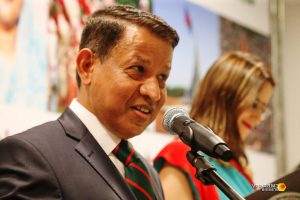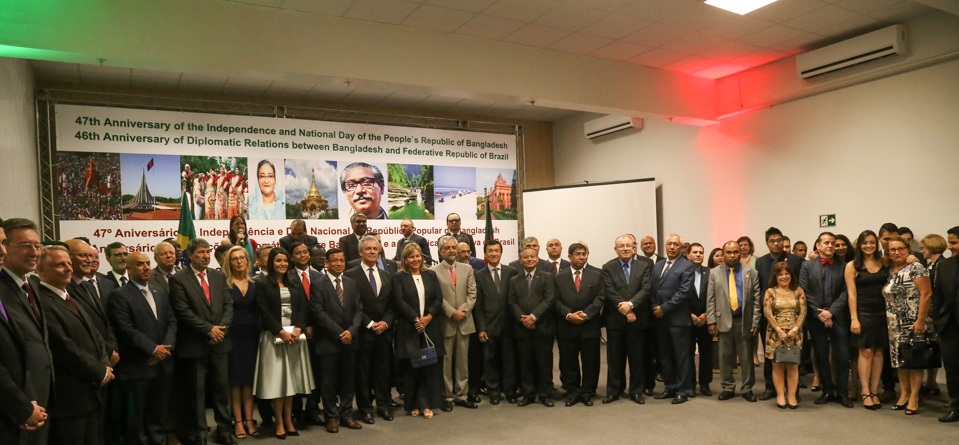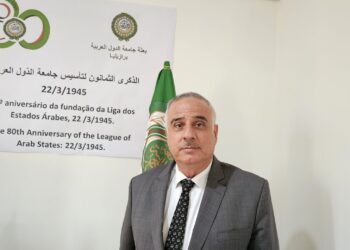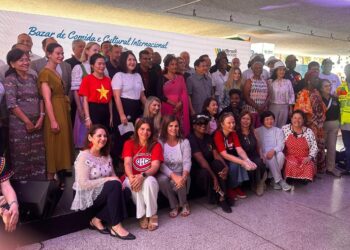
Súsan Faria
Photos: Eliane Loin
In the war for the liberation of Bangladesh – an Asian country bordering India – three million people died and 200,000 women and girls were raped. The data were recalled by the ambassador of Bangladesh in Brasilia, Mohammed Rahman, during the commemorations of the national date of the country, on Monday, 26, in the hall of the Hotel Brasília Imperial, in the Capital. The diplomat referred to the victims of the 1971 Liberation War and Sheikh Mujibur Rahman, who proclaimed the independence of the Bengali nation.

“Bangladesh has already become a low-middle income country. We intend to become developed in 2041, “he explained. On March 15 of this year, the United Nations declared that it fulfilled all the criteria to graduate in the status of a growing country. Brazil recognized the independence of that nation in 1972. Since then, according to Zulfiqur Rahman, relations between these two countries have been expanding at a steady pace, with a similar and cooperative worldview in the global forums. However, there is a need to better explore the opportunities to expand the markets of both countries, which – according to the ambassador – will bring gains in imports and exports, trade, investment, science and technology, human resources, education and health.

Finally, the diplomat cited tourist attractions such as the Cox Bazaar, the 120-kilometer-long beach, the world’s longest uninterrupted beach; Sundarban (the beautiful forest) and the largest mangrove forest in the world; and the hospitality of the Bangladeshi people.

In his view, Bangladesh is a country with rich cultural manifestations, great literary tradition and an ancient history. He exemplified that the Bangladeshi National Anthem, Amar Sonar Bangla, is an ode written by Rabindranath Tagore, the first non-European to win the Nobel Prize for Literature in 1913. “The legacy of the Bangladeshi poet Tagore, shared by Bangladesh and India, is a world literature in the twentieth century. “
Ambassador Quintella was in Dhaka in March 2017 to attend the first meeting of bilateral political consultations. The two countries, he said, are demographic giants, with dynamic societies and countless potentialities to develop.
History – The Bangladesh liberation war was fought between West Pakistan (now Pakistan) and East Pakistan (now Bangladesh) and India. The war lasted from March 26 until December 16, 1971. India supported East Pakistan, which achieved victory and became a new country. There were differences of race, ethnicity, religion and economy in the region (both Pakistan). Because of these differences, the Eastern side sought independence. Currently Bangladesh has 160 million inhabitants, largely muslim, and the economy is mainly focused on the textile industry.

Em festa pela data nacional, embaixador Mohammed Zulfiqur Rahman disse que ONU já declarou a Bangladesh status de país em crescimento e que será desenvolvido até 2041
Na guerra pela libertação de Bangladesh – pais asiático, fronteiriço com a Índia – três milhões de pessoas morreram e 200 mil mulheres e meninas foram violentadas. Os dados foram lembrados pelo embaixador de Bangladesh em Brasília, Mohammed Rahman, durante as comemorações da data nacional do país, na noite de segunda-feira, 26, no salão do Hotel Brasília Imperial, na Capital. O diplomata se referiu às vítimas da Guerra de Libertação de 1971 e ao Sheikh Mujibur Rahman, que proclamou a independência da nação Bengali.
“Isso aconteceu depois de mais de duas décadas de nossa pacífica luta política para romper a tensão da opressão política, do apartheid cultural e das injustiças econômicas”, lembrou Mohammed Rahman. A seu ver, Bangladesh ergueu-se como “uma fênix das devastações da Guerra de Libertação de 1971 e do genocídio e agora é uma nação orgulhosa, liderada pela primeira-ministra Sheikh Hasina”. Segundo o embaixador, o país caminha para alcançar sua Visão 2021, ou seja, tornar-se um país de renda média até o 50º aniversário da independência.

Por último, o diplomata citou lugares turísticos como o Bazar de Cox, a praia de 120 km de comprimento, a maior praia ininterrupta do mundo; Sundarban (a bela floresta) e a maior floresta de mangue do mundo; e a hospitalidade do povo bengalês.
Tagore – O diretor do Departamento da Ásia Central, Meridional e Oceania, embaixador Ary Quintella, disse que o Brasil foi um dos primeiros países a estabelecer relações diplomáticas com Bangladesh. A embaixada brasileira foi aberta em Daca em 1974, a primeira de uma nação latino-americana naquela capital. “Desde cedo reconhecimentos em Bangladesh um parceiro importante para a política externa brasileira”, disse Quintella.
A seu ver, Bangladesh é um país com ricas manifestações culturais, grande tradição literária e uma história milenar. Exemplificou que o Hino Nacional bengali, Amar Sonar Bangla, é uma ode escrita por Rabindranath Tagore, o primeiro não europeu a ganhar o Prêmio Nobel de Literatura, em 1913. “O legado do poeta bengali Tagore, compartilhado por Bangladesh e índia, é um marco da literatura mundial no século XX”.
O embaixador Quintella esteve em Daca em março de 2017 para participar da primeira reunião de consultas políticas bilaterais. Os dois países, segundo ele, são gigantes demográficos, com sociedades dinâmicas e incontáveis potencialidade a desenvolver.
História -A Guerra da Libertação de Bangladesh foi travada entre o Paquistão Ocidental (atual Paquistão) e o Paquistão Oriental (atual Bangladesh) e a Índia. A guerra durou de 26 março até 16 de dezembro de 1971. A Índia apoiou o Paquistão Oriental, que conseguiu a vitória e se tornar um novo país. Existiam diferenças de raças, de etnia, religião e economia na região (nos dois Paquistão). Devido a essas diferenças, a parte Oriental buscou sua independência. Atualmente Bangladesh tem 160 milhões de habitantes, em grande parte mulçumana, e a economia é voltada principalmente para a indústria têxtil.


















